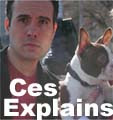Mathew Gross presents:
How to Steal an Election
You send letters to newly registered voters in Democratic districts. Letters that come back as undeliverable are used to form a list. You send 8,000 lawyers to every polling place armed with that list. When a newly registered (black) voter shows up to vote, you challenge their registration. In Ohio, the poll worker makes the final decision as to whether the challenged voter can cast a ballot. The poll worker is a hard-core GOP partisan. The poll worker says no; the voter is sent home. Frustrated eligible voters in line give up because it's taking forever, and more Democratic voters decide to leave without casting ballots. Repeat until George Bush is President.
Coming soon to an election near you.
Nick Confessore over at the
American Prosepect picks up the theme:
First, the GOP, using what appear to qualify as illegal methods, has attempted to mislead thousands of Democratic-leaning voters in Nevada, New Mexico, Ohio, Pennsylvania, and elsewhere, into thinking they'd be registered but are not. (And Ed Gillespie, whose own outfit is funding these efforts via Sproul & Associates and God knows what other firms and consultants, is alleging Democratic fraud in precisely those states! Black is white. Up is down.)
Consequently, those thousands of people are going to show up at polls and probably run into a lot of confusion and paperwork and problems. At the same time, Republican secretaries of state and election officials in Ohio, Florida, and elsewhere are pushing interpretations of election statutes that further muddy the waters for those who do get to vote.
Having done as much as possible to create the conditions for a confusing election, the GOP is getting ready to cast the inevitable results of that confusion -- people turning up in the wrong precincts, people who've moved from the neighborhood they originally registered and are trying to vote wherever they live now, and so forth -- as symptoms of outright election fraud.
On Election Day, the GOP will challenge as many votes as they can at the polls, on whatever pretext is handy. They've already said they will. And then, if they're behind at the end of the day, GOP officials will start alleging massive voter fraud in Ohio, Florida, and elsewhere, whatever the facts on the ground are. That will give them a rhetorical advantage in the short-term -- if, say, John Kerry is far enough ahead that he declares victory, but there are still some votes to be counted or re-counted.
And it's important for the long-term, too. If Kerry does win, but only narrowly, the GOP will allege that the Democrats stole the election, which will set the stage for later Republican efforts to shut down Kerry's ability to govern and deny him legitimacy.
Matthew Yglesias
addsIt's worth noting that the efficacy of issuing blanket challenges to the credentials of voters in predominantly African-American precincts isn't necessarily contingent on the challenger actually getting many voters disqualified. If you challenge enough people, you slow the voting process down, generating long lines at the polling places, which may dissuade people with a limited amount of time on their hands from sticking around and actually casting their ballots.
That's closer to gamesmanship than cheating, but unless the Democrats are prepared to cope with it, it could prove very costly.













No comments:
Post a Comment